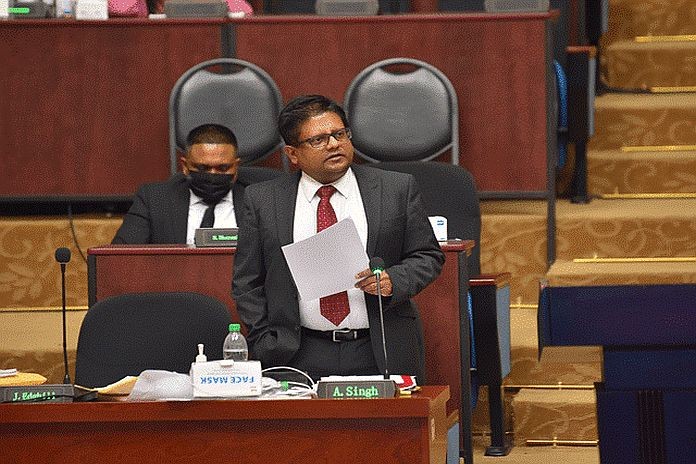By Kemol King
GEORGETOWN, Guyana, (DPI) – The Natural Resource Fund Act 2021 has paved the way for government to make withdrawals from the Fund, through a transparent mechanism guided by parliamentary scrutiny, to finance the pressing development needs of the country.
These needs are numerous. The government is tasked with:
- Responding to COVID-19 which has already claimed over 1,000 lives locally and strains the public healthcare system;
- Handling setbacks in the education sector from the implications of the pandemic guidelines on the provision of vital education services;
- Upgrading and expanding transport infrastructure, in response to dilapidation and modernisation pressures;
- Building climate resilience to prevent disasters like the May/June 2021 flooding event which had devastating impacts on communities;
- Promoting the development of industries through which Guyanese may build generational wealth;
- Reducing the cost of living.
Investments into improvement of services, and initiatives which could make the lives of Guyana’s people easier, are needed now more than ever. The ministry of finance has held that those investments should be made using Guyana’s own resources, instead of taking on costly debts.
While addressing the National Assembly on the night the Natural Resource Fund Bill 2021 was passed, senior minister in the office of the president with responsibility for finance, Dr Ashni Singh said: “This Bill is going to facilitate an accelerated development agenda. It will facilitate investment in critical infrastructure. It will facilitate investment in critical social services. It will improve people’s lives.”
The Natural Resource Fund’s withdrawal rule allows for annual withdrawals from the Fund to be limited to deposits made in the preceding fiscal year. However, it makes an exception for the first fiscal year, allowing government to withdraw the total balance of just over US$600 million at once.
“The immediate need for sound and transformative investments in order to advantageously position our economy to ensure that the benefits from the oil and gas sector redound towards the wider economy and all Guyanese,” the finance ministry had said in a December statement, justifying this rule.
The finance minister said that the rule strikes an appropriate balance between the imperative of saving into the longer term, and in the shorter term, being able to address the development imperatives of the country.
To give effect to this development agenda, His Excellency Dr Mohamed Irfaan Ali is preparing to appoint a Board of Directors to be responsible for the overall management of the Fund. A mechanism of this nature was absent from the now-repealed APNU+AFC Act, and had left room for the subject Minister to usurp those management functions.
The composition of the nine-member Public Accountability and Oversight Committee, which is also to be appointed, emphasises practicality. Down from 22 members in the Act’s previous iteration, this new Oversight Committee will allow for effective non-governmental oversight of the Fund. However, provisions drafted with transparency and accountability in mind, are not confined only to this committee.
“Every single dollar requires ex ante approval by the National Assembly in appropriation,” Dr Singh explained on the night the Bill was passed.
“Every single dollar to be spent will be subject to parliamentary scrutiny in the budgetary process ex ante, and in the exposed auditing process, and scrutiny by the public accounts committee and those established constitutional and parliamentary structures that are in place.”
The parliamentary process will allow for total scrutiny of the government’s development agenda, with livestreams reaching every household in Guyana with a television, smartphone, computer system or applicable radio channel.
It is notable that the new withdrawal rule sets out calculations which can be easily demonstrated to the public, whereas the old rule was so complex that it was criticised by the Inter-American Development Bank for conspiring against public understanding.
The Act also mandates the publication of annual, quarterly and monthly reports, and receipts of all petroleum revenues. Stiff penalties for failure to uphold the Act’s reporting principles seek to prevent a recurrence of any event resembling the time the APNU+AFC government hid the US$18 million signing bonus from the general public for over a year.
The Natural Resource Fund Act 2021 promotes transparent management of Guyana’s natural resource wealth, to ensure that withdrawals from the Fund are above board.





